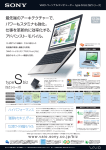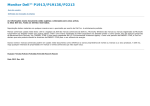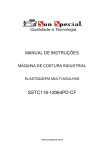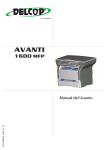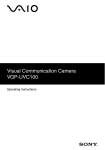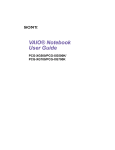Download Sony VGP-UHDP04 Operating Instructions
Transcript
Hard Disk Drive VGP-UHDP04 Operating Instructions http://www.sony.net/ 2006 Sony Corporation / Printed in Japan 2-664-906-12 (1) WARNING To reduce the risk of fire or electric shock, do not expose this apparatus to rain or moisture. To avoid electrical shock, do not open the cabinet. Refer servicing to qualified personnel only. The shielded interface cable recommended in this manual must be used with this equipment in order to comply with the limits for a digital device pursuant to subpart B of Part 15 of FCC. You are cautioned that any changes or modifications not expressly approved in this manual could void your authority to operate this equipment. For questions regarding your product or for the Sony Customer Information Service Center nearest you, call 1-888-476-6972 in the United States or 1-800961-7669 in Canada. The number below is for FCC related matters only. For customers in the U.S.A. Owner’s Record The model number and the serial number are located on the bottom of the hard disk drive. Record the serial number in the space provided below. Refer to this number whenever you call your Sony dealer regarding this product. Model No. VGP-UHDP04 Serial No. ________________________________ FCC Notice This equipment has been tested and found to comply with the limits for a Class B digital device, pursuant to Part 15 of the FCC Rules. These limits are designed to provide reasonable protection against harmful interference in a residential installation. This equipment generates, uses, and can radiate radio frequency energy and, if not installed and used in accordance with the instructions, may cause harmful interference to radio communications. However, there is no guarantee that interference will not occur in a particular installation. If this equipment does cause harmful interference to radio or television reception, which can be determined by turning the equipment off and on, the user is encouraged to try to correct the interference using one or more of the following measures: – Reorient or relocate the receiving antenna. – Increase the separation between the equipment and receiver. – Connect the equipment into an outlet on a circuit different from that to which the receiver is connected. – Consult the dealer or an experienced radio/TV technician for help. Declaration of Conformity Trade Name: SONY Model No.: VGP-UHDP04 Responsible Party: Sony Electronics Inc. Address: 16450 W. Bernardo Dr, San Diego, CA 92127 U.S.A. Telephone No.: 858-942-2230 This device complies with Part 15 of the FCC Rules. Operation is subject to the following two conditions: (1) This device may not cause harmful interference, and (2) this device must accept any interference received, including interference that may cause undesired operation. For customers in Canada This Class B digital apparatus complies with Canadian ICES-003. AVERTISSEMENT Afin de réduire les risques d’incendie ou de choc électrique, n’exposez pas cet appareil à la pluie ni à l’humidité. Pour prévenir tout risque d’électrocution, ne pas ouvrir le boîtier. Confier l’entretien de l’appareil à un technicien qualifié uniquement. Pour les utilisateurs au Canada Cet apparell numérique de la classe B est confrme à la norme NMB-003 du Canada. Le fonctionnement de cet appareil est lié aux deux conditions suivantes : (1) cet appareil ne doit pas causer d’interférences et (2) cet appareil doit être capable de recevoir toutes les interférences, y compris celles susceptibles de provoquer un problème de fonctionnement. 2 Be careful not to lose the wireless keys Be careful not to lose the wireless key registered to the hard disk drive. If you lose both of the wireless keys, the hard disk drive cannot be recognized by your computer. See “If you lose a wireless key/If the wireless key is broken” (page 20). Make sure to backup the data with some other media Make sure to backup the data of the hard disk drive. If the data is lost or damaged, there is no guarantee that it can be restored. • VAIO and Corporation. are trademarks of Sony • Microsoft and Windows are registered trademarks of Microsoft Corporation in the United States and/or other countries. Table of Contents Overview ................................................ 4 Special features ............................... 5 Compatible computers ..................... 5 Supplied Accessories .............................. 6 Locating the Controls and Connectors ... 7 Getting Started ........................................ 8 Connecting the hard disk drive ......... 8 About the power management function (power save function) ..... 9 Disconnecting the hard disk drive from the computer ....................... 10 Using the Security Function ................. 11 About the hard disk drive security function .......................... 11 About handling the wireless key ... 11 Setting the security function .......... 12 Using the hard disk drive (secure mode) ............................. 14 Deactivating the security function . 15 Precautions ........................................... 16 Maintenance ......................................... 17 Getting Help ......................................... 18 Specifications ....................................... 18 If you lose a wireless key/ If the wireless key is broken ............. 20 Troubleshooting .................................... 21 • All other names of systems, products and services are trademarks of their respective owners. • In the document, the ™ or ® marks are not specified. In this document, Microsoft® Windows® 2000 Professional are referred to as Windows 2000. Microsoft® Windows® XP Home Edition and Microsoft® Windows® XP Professional are referred to as Windows XP. 3 Overview The VGP-UHDP04 is a hard disk drive that is compatible with USB2.0 interface. The hard disk drive has the following features: • A 1.8 inch, approx. 40 * GB hard disk drive with a built-in security function and a maximum transfer rate of 265 Mbps. • The ability used to store large amounts of data. • This hard disk drive corresponds to a Sony VAIO computer or IBM PC/ AT computer preinstalled with the Windows 2000 or Windows XP operating system. Using the hard disk drive with these computer systems not only increases your computer's storage capacity, but also allows for easy data transfer between computers. Notes • This hard disk drive is only for use in the country of purchase. • Use with the above configuration is not necessarily guaranteed. For example, use with a home-built computer, "White box" computer, computer with an upgraded operating system, or a computer installed with a dual operating system is not guaranteed. * 4 1 GB is equivalent to 1,000,000,000 bytes. Available capacity may vary. Special features Security function (page 11) You can lock/unlock the hard disk drive by registering the supplied wireless key. Note Be sure not to lose the registered wireless keys. If both wireless keys are lost, your computer may not recognize the hard disk drive. See “If you lose a wireless key/If the wireless key is broken” (page 20). Compatible computers The hard disk drive can be used in conjunction with the following USB 1.1/ 2.0 compatible computers (as of January 2006). • The following Sony VAIO computers: Computers with Windows 2000 or Windows XP preinstalled. • The following IBM PC/AT compatible computer: Computers with Windows 2000 or Windows XP preinstalled. Notes • This hard disk drive is only supported by computers with the Windows 2000 and Windows XP operating system preinstalled, and is not compatible with older computers running operating systems that have been upgraded to Windows 2000 and Windows XP. • This hard disk drive does not support the Windows Millennium Edition, Windows 98 Second Edition operating system or earlier versions of the Windows operating system. This hard disk drive will not work if you connect it to the USB connector of a computer with a preinstalled operating system that is not compatible with the hard disk drive. • Use with a home-built computer, “White box” computer, computer with an upgraded operating system, or a computer installed with a dual operating system is not guaranteed. • To use the hard disk drive, log on to the computer with administrator privileges. If you do not log on with administrator privileges, you might not be able to access certain folders that are restricted. • Restricting access to folders prevents access to those folders from other computers. To restrict access, refer to Help for Windows 2000 and Windows XP shared folder settings. 5 Supplied Accessories After unpacking the hard disk drive, make sure that the accessories listed below are present. If anything is missing or damaged, contact the Sony dealer where you purchased this product or a Sony service representative in your area. • Hard disk drive (1) • USB cable (1) • Wireless key (2) • Pouch (1) • Operating Instructions (this document) (1) • Warranty Card (1) 6 Locating the Controls and Connectors 1 USB connector 2 CANCEL button 3 REGIST button 4 Wireless key receiver 5 POWER indicator 6 ACCESS indicator 7 LOCK indicator 8 UNLOCK indicator 7 Getting Started Connecting the hard disk drive You can connect the hard disk drive to the computer using the supplied USB cable. Notes • Place the hard disk drive on a flat surface. • Do not connect the hard disk drive to an external USB hub (port) other than USB port of a computer. z Tip If you connect the hard disk drive with the computer for the first time, it takes time for a while to recognize the hard disk drive. After connecting the hard disk drive, double-click [My Computer], then check that the “[Local Disk (F:) ], etc.*” is added to [My Computer]. * "F:" is a name of hard disk drive and changed depending on the computer. 8 About the power management function (power save function) When using the computer’s power management function (power save function), note the following points: • Set your computer so that it does not switch to a power save mode while the ACCESS indicator on the hard disk drive is flashing. For more information, refer to the manuals provided with your computer. • Before switching your computer to a power save mode, make sure the hard disk drive’s ACCESS indicator is not illuminated, and then close software that is running. • While the computer is in a power save mode, do not connect or disconnect the USB cable. Continued on next page 9 Disconnecting the hard disk drive from the computer Follow the procedure below to disconnect this hard disk drive from your computer. (The following procedures are for Windows XP.) Notes • Before disconnecting the hard disk drive, close any open software. • If the message below appears when you attempt to disconnect the hard disk drive, close any running software, wait for a while and then repeat the procedure. “Problem Ejecting USB Mass Storage Device. The device ‘Generic Volume’ cannot be stopped right now. Try stopping the device again later”. z Tip To use the hard disk drive again after disconnecting the USB cable, perform the steps described in the section “Connecting the hard disk drive” (page 8). The hard disk drive will be detected automatically by your Windows operating system. The icon appears on the taskbar when the hard disk drive is recognized by the computer. To disconnect the hard disk drive from the computer, use the icon. 1 Click the icon on the taskbar. The “Safely remove USB Mass Storage Device” message appears. 2 Click “Safely remove USB Mass Storage Device”. The message “The ‘USB Mass Storage Device’ device can now be safely removed from the system” appears. 3 10 After the POWER indicator light goes out, disconnect the USB cable. Using the Security Function About the hard disk drive security function You can lock the hard disk drive using the wireless key. When you register the wireless key(s), you cannot use the hard disk drive until you release the lock using the wireless key each time you connect the USB cable. Enabling the security function to secure your important data is recommended. Note You need to register the two wireless keys. Be sure not to lose them. If you lose just one, see "If you lose a wireless key/If the wireless key is broken" (page 20). If both wireless keys are lost, your computer may not recognize the hard disk drive. About handling the wireless key It is recommended that you keep the wireless key separate from the hard disk drive, in case the hard disk drive is lost or stolen. Continued on next page 11 Setting the security function Notes • Do not disconnect the USB cable when the wireless keys are being registered. • Be sure that the computer is not in power save mode when the wireless keys are being registered. • You need to register both wireless keys. • Be sure that the ACCESS indicator goes out before registering the wireless key. 1 Turn on the computer and connect the hard disk drive using the USB cable (page 8). 2 Press the REGIST button. The blue light of the wireless key receiver flashes. z Tip If you do not touch the wireless key receiver with a wireless key for more than about 5 seconds, the blue light of the wireless key receiver will go out and the previous status returns. 3 Touch the wireless key receiver with one of the wireless keys. The LOCK and UNLOCK indicators flash alternately, then the wireless key is registered to the hard disk drive. 12 4 Touch the wireless key receiver with the other wireless key after the blue light of the wireless key receiver starts to flash again. The blue light will go out after the other wireless key is registered. z Tips • The blue light of the wireless key receiver repeats this pattern: flashes twice and goes out for one second. If you do not touch the wireless key receiver with the wireless key for more than about 5 seconds, the blue light of the wireless key receiver goes out and the previous status returns. In this case, follow the procedure from step 1 again to register the wireless key. • If the blue light of the wireless key receiver keeps flashing even after touching wireless key receiver with the wireless key, you may have touched it with the first key by mistake. Try touching with the other key. • If you use the Windows 2000 operating system, “Unsafe Removal of Device” appears. 5 Disconnect the hard disk drive form the computer (page 10). Registering is complete. The security function will be activated from the next time you connect the USB cable to the computer. Continued on next page 13 Using the hard disk drive (secure mode) If you use the hard disk drive registered with wireless key, you need to perform the following procedures each time you connect the USB cable to the computer. Furthermore, you may also need to use the procedures after: • restarting the computer • returning from hibernation • returning from standby mode. 1 Turn on the computer then connect the USB cable (page 8). The LOCK indicator lights and the blue light of the wireless key receiver flashes. z Tips • If you do not operate the hard disk drive for more than about 8 seconds, while the blue light of the wireless key receiver flashes, the hard disk drive turns off. In this case, disconnect the USB cable and reconnect it. • If you use the Windows 2000 operating system, when the hard disk drive turns off, “Unsafe Removal of Device” appears. 2 Touch the wireless key receiver with either registered wireless key. The UNLOCK indicator lights and the hard disk drive is recognized by the computer. Note The blue light may flash after recognizing the hard disk drive on some computers when returning from hibernation mode or restarting. In this case, touch the wireless key receiver with the wireless key again. 14 Deactivating the security function If you want to deactivate the security function of the hard disk drive, follow the steps. 1 Connect the hard disk drive to the computer and touch the wireless key receiver with the wireless key to unlock. 2 Press the CANCEL button using a pointed object, such as ball-point pen. The LOCK and UNLOCK indicator flash alternately for one second, then the UNLOCK indicator lights. The security function is deactivated. When you connect the hard disk drive to the computer using the USB cable next time, you can use the hard disk drive without the wireless key. z Tip If you want to use the security function again, you must register the wireless keys again (page 12). Notes • If you leave the hard disk drive unattended when the security is deactivated, not only is your data unguarded, but someone could register other wireless keys (not yours) to the hard disk drive. It is recommended that you enable the security function whenever you leave the hard disk drive unattended. • Even if you press the CANCEL button while the ACCESS indicator is flashing, the security is not deactivated. Be sure that the ACCESS indicator goes out before pressing the CANCEL button. 15 Precautions Usage and storage locations Do not use or store this hard disk drive in locations subject to high humidity, high temperatures, strong vibrations, or direct sunlight. Operation • Do not move the hard disk drive during operation. This prevents the possibility of malfunctions. • Place the hard disk drive on a flat, stable surface for operation. • Do not place any objects on top of the hard disk drive. • Protect the hard disk drive from sudden temperature changes. Do not use the hard disk drive immediately after moving it from a cold to a warm location or after the ambient temperature has risen drastically. Otherwise, condensation inside the hard disk drive can occur. If the temperature changes drastically during operation, stop using the hard disk drive while keeping power to the hard disk drive turned on and let it stand for about an hour, then turn the power off. • Do not use the hard disk drive during periods of possible lightning strikes. Lightning can cause electric shock or damage the hard disk drive. To avoid fire, electric shock or damage to the product during periods of possible lightning strikes, disconnect the hard disk drive from the computer and unplug the hard disk drive from the 16 power source. Furthermore, if you hear thunder, do not touch the hard disk drive or the computer. • Do not damage the cables. Cable damage can result in fire or electric shock. – When installing the product, do not place cables between the wall and a rack or shelf, where they could become pinched. – Do not damage or modify the cables in any way. – Do not place any heavy objects on the cables, and avoid bending or pulling the cables unnecessarily. – Do not place the hard disk drive near a heater or allow it to become hot. – Always grasp the plug when removing cables. • Do not touch the hard disk drive for long periods when the hard disk drive is on. • Do not use the hard disk drive placed on cloth or a mattress. • Use the USB cables specified. • Do not block the air vent. Blocking the air vent can cause heat to build up inside the hard disk drive, resulting in damage or fire. To ensure that the hard disk drive is well ventilated, note the following points: – Place the hard disk drive at least 10 cm from any walls. – Do not place the hard disk drive in a closed or narrow space. – Do not place the hard disk drive on carpet, rugs, mattresses or cloth. – Do not wrap the hard disk drive in cloth. – Do not use the hard disk drive turned over or upside down. • Do not stand or place any heavy objects on the product. • Make sure connectors are securely connected. Do not allow metal objects to fall inside the connectors. If a short circuit occurs between the pins in the connectors, fire or damage to the hard disk drive may result. • During data transfer, do not disconnect the USB cable or turn off the computer. Doing so can result in loss of data or data corruption. Sony will not accept any liability for data loss or data corruption. • Make sure you backup your data with some other media (such as CD-R, CD-RW, DVD-R, DVD-RW, DVD+R, DVD+RW and so on). We recommend always maintaining two backup copies at all times one of your original before updating it, and one of the original after updating it. Data can be erased or corrupted in the following cases: – Incorrect usage of the hard disk drive – Placing the hard disk drive near a magnet or magnetic device – Subjecting the hard disk drive to vibrations or shock – Damaging or repairing the hard disk drive – Damage caused by natural disaster – Turning the hard disk drive on and off over short periods of a few seconds Transportation • When you transport the hard disk drive, carry it gently and with due caution to prevent damage. • Before moving the hard disk drive, unplug the cables. Maintenance Cleaning the cabinet • Wipe the outside of the hard disk drive with a soft, dry cloth. To remove stubborn stains, moisten the cloth with a mild, neutral detergent. Do not use solvents, cleaning alcohol, benzene, or other substances that may damage the finish. • Unplug the hard disk drive before cleaning. In the above cases, or in any other instance of data loss or data corruption, Sony will not accept any liability whatsoever. 17 Getting Help This section provides information on how to get help and support from Sony, and troubleshooting tips for your hard disk drive. Specifications Drive Capacity Approx. 40 GB 1) Format NTFS About Sony’s support options Revolutions per minute 4200 rpm Data transfer rate Sony provides several support options for your hard disk drive. When you have questions about your hard disk drive or the software, refer to the following: ❑ This guide explains how to use your hard disk drive. For customers in the United States and Canada ❑ The Sony Customer Information Service Center offers information about your VAIO computer and other Sony products that work with your computer. To contact Sony Customer Information Service Center, call 1-888-4SONYPC (1-888-476-6972). ❑ Sony Computing Support provides instant access to information on commonly encountered problems. Type a description of the problem and the Knowledge Database searches for corresponding solutions online. You can visit Sony Online Support at: http://www.sony.com/pcsupport . 18 Max: 265 Mbps when reading 2) 265 Mbps when writing 2) 1) 1 GB is equivalent to 1,000,000,000 bytes. Available capacity may vary. 2) Varies according to the workload of the computer connected to the hard disk drive. Connectors USB Mini-B (1) Operating environment Operating temperature 41°F to 95°F (5°C to 35°C) (temperature gradient less than 18°F (10°C)/hour) Operating humidity 20% to 80% (no condensation), provided that humidity is less than 65% at 95°F (35°C) (hygrometer reading of less than 84°F (29°C)) Storage temperature –4°F to 140°F (–20°C to 60°C) (temperature gradient less than 18°F (10°C)/hour) Storage humidity 10% to 90% (no condensation), provided that humidity is less than 20% at 140°F (60°C) (hygrometer reading of less than 95°F (35°C)) Other specifications Power consumption Under normal conditions: approx. 2 W Dimensions Approx. 2.5 × 0.9 × 3.8 inches (63 × 21 × 95 mm) (w × h × d) Mass Approx. 6.0 oz. (169 g) Design and specifications are subject to change without notice. 19 If you lose a wireless key/ If the wireless key is broken If you lose a wireless key If you lose both of the wireless keys, the hard disk drive cannot be recognized. In this case, you cannot restore the hard disk data. However, if you lose only one wireless key, buy a new wireless key from the Sony dealer where you purchased this product or a Sony service representative in your area, and set the security function again (page 12). Note When you replace a wireless key (by ordering from the Sony dealer where you purchased this product or a Sony service representative in your area), be sure to handle the wireless key you still have with care. If the wireless key is broken If you touch the wireless key receiver with the wireless key registered to the hard disk drive, but the security lock does not release, or you cannot register the wireless key at the factory setting, the wireless key may be broken. In this case, call for the Sony dealer where you purchased this product or a Sony service representative in your area. Checklist of required items for the Sony dealer where you purchased this product or a Sony service representative in your area: ❑ If both of the wireless keys are broken, bring the hard disk drive, warranty card and two wireless keys. ❑ If one key is broken (but the other key is working), bring the broken key and warranty card. 20 Troubleshooting If a problem occurs during operation of the unit, refer to the information provided in this section. If the problem persists, consult your nearest Sony dealer. For contact information, see “Getting Help” (page 18). Also refer to the manuals provided with your computer. Symptom Cause/Remedy The hard disk drive is not recognized by the computer (The icon of the hard disk drive does not appear in [My Computer].), or does not work properly. c If the computer returns from hibernation to normal operating mode or turns on while the hard disk drive is connecting, the computer may not recognize the hard disk drive correctly. In this case, disconnect the USB cable from the hard disk drive and reconnect it. c The hard disk drive may not be connected correctly to the computer with an USB cable. See “Connecting the hard disk drive” (page 8). c The operating system is not Windows 2000 or Windows XP. c USB is designed to support connection of more than one peripheral equipment working simultaneously, however, some combinations of peripheral equipment can cause unstable operation. Turn off all peripheral equipment, disconnect all unnecessary devices, check the cable connections, and then turn the power back on. c To reset the USB interface, shut down your Windows operating system, turn the computer off, and disconnect the USB cable. c The hard disk drive may be locked. For details, see "Using the hard disk drive (secure mode)" (page 14). Data transfer rate is low. c The power management function of the computer may be active. For details, refer to the manuals provided with your computer. c The transfer rate varies according to the workload of the computer. c If you connect the computer corresponding to USB1.1, the data transfer rate will be about 1/40 compared to the computer corresponding to USB2.0. Continued on next page 21 Symptom Cause/Remedy Data read/write failure. c The hard disk drive does not function correctly with old versions of Windows that have been upgraded. c The hard disk drive has been shaken or bumped. Place the hard disk drive in a flat, stable position. c If you are using more than one USB device, disconnect all USB devices from the computer, and then connect the hard disk drive directly to the computer so that it is the only hard disk drive connected. Cannot read/write data. c You cannot read data from the hard disk drive or write data to the hard disk drive if it is not correctly connected to the computer. See “Connecting the hard disk drive” (page 8). c Writing data to the hard disk drive is not possible if there is not enough free space available on the hard disk drive. Check the amount of free space available on the hard disk drive. c After moving the hard disk drive from a cold to a warm location, condensation may develop inside the hard disk drive. Let the hard disk drive stand for a while before using it. An error message appears after you disconnect the USB cable. c In order to safely disconnect the USB cable from the hard disk drive, you need to click the Safely Remove Hardware icon on the taskbar. See “Disconnecting the hard disk drive from the computer” (page 10). Cannot access folder. c If you do not log on with administrator privileges, you might not be able to access some folders. Log on with administrator privileges. c If access restrictions are set for folders, those folders cannot be accessed from other computers. For details, refer to the topic in Windows 2000 or Windows XP Help regarding shared folder settings. Cannot lock/unlock hard disk drive security. 22 c Use the correct wireless key. c Touch the correct part (wireless key receiver) of the hard disk drive with the wireless key. See "Locating the Controls and Connectors" for the wireless key receiver (page 7).























